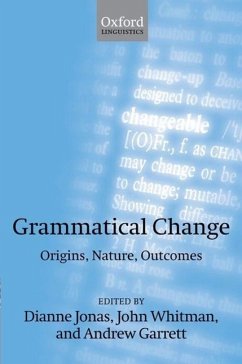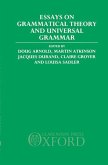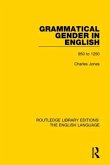Grammatical Change
Origins, Nature, Outcomes
Herausgeber: Jonas, Dianne; Garrett, Andrew; Whitman, John
Grammatical Change
Origins, Nature, Outcomes
Herausgeber: Jonas, Dianne; Garrett, Andrew; Whitman, John
- Gebundenes Buch
- Merkliste
- Auf die Merkliste
- Bewerten Bewerten
- Teilen
- Produkt teilen
- Produkterinnerung
- Produkterinnerung
This book advances research on grammatical change and shows the breadth and liveliness of the field. International scholars report on the nature and outcomes of all aspects of syntactic change, including grammaticalization, variation, syntactic movement, determiner-phrase syntax, pronominal systems, case systems, negation, and alignment.
Andere Kunden interessierten sich auch für
![Grammatical Relations Grammatical Relations]() Patrick FarrellGrammatical Relations93,99 €
Patrick FarrellGrammatical Relations93,99 €![Grammatical Constructions Grammatical Constructions]() Thompson ShibataniGrammatical Constructions220,99 €
Thompson ShibataniGrammatical Constructions220,99 €![Nonfinite Structures in Theory and Change Nonfinite Structures in Theory and Change]() D Gary MillerNonfinite Structures in Theory and Change319,99 €
D Gary MillerNonfinite Structures in Theory and Change319,99 €![Essays on Grammatical Theory and Universal Grammar Essays on Grammatical Theory and Universal Grammar]() Doug Arnold / Martin Atkinson / Jacques Durand / Claire Grover / Louisa Sadler (eds.)Essays on Grammatical Theory and Universal Grammar211,99 €
Doug Arnold / Martin Atkinson / Jacques Durand / Claire Grover / Louisa Sadler (eds.)Essays on Grammatical Theory and Universal Grammar211,99 €![The Arabic Grammatical Tradition The Arabic Grammatical Tradition]() Yasir SuleimanThe Arabic Grammatical Tradition132,99 €
Yasir SuleimanThe Arabic Grammatical Tradition132,99 €![A Dictionary of Grammatical Terms in Linguistics A Dictionary of Grammatical Terms in Linguistics]() R L TraskA Dictionary of Grammatical Terms in Linguistics181,99 €
R L TraskA Dictionary of Grammatical Terms in Linguistics181,99 €![Grammatical Gender in English Grammatical Gender in English]() Charles JonesGrammatical Gender in English180,99 €
Charles JonesGrammatical Gender in English180,99 €-
-
-
This book advances research on grammatical change and shows the breadth and liveliness of the field. International scholars report on the nature and outcomes of all aspects of syntactic change, including grammaticalization, variation, syntactic movement, determiner-phrase syntax, pronominal systems, case systems, negation, and alignment.
Hinweis: Dieser Artikel kann nur an eine deutsche Lieferadresse ausgeliefert werden.
Hinweis: Dieser Artikel kann nur an eine deutsche Lieferadresse ausgeliefert werden.
Produktdetails
- Produktdetails
- Verlag: Oxford University Press (UK)
- Seitenzahl: 400
- Erscheinungstermin: 20. Februar 2012
- Englisch
- Abmessung: 242mm x 165mm x 33mm
- Gewicht: 760g
- ISBN-13: 9780199582624
- ISBN-10: 0199582629
- Artikelnr.: 33158494
- Herstellerkennzeichnung
- Libri GmbH
- Europaallee 1
- 36244 Bad Hersfeld
- gpsr@libri.de
- Verlag: Oxford University Press (UK)
- Seitenzahl: 400
- Erscheinungstermin: 20. Februar 2012
- Englisch
- Abmessung: 242mm x 165mm x 33mm
- Gewicht: 760g
- ISBN-13: 9780199582624
- ISBN-10: 0199582629
- Artikelnr.: 33158494
- Herstellerkennzeichnung
- Libri GmbH
- Europaallee 1
- 36244 Bad Hersfeld
- gpsr@libri.de
Dianne Jonas (PhD Harvard University 1997) is currently replacement professor of English Linguistics at Goethe University, Frankfurt. Her main research interests are comparative Scandinavian syntax, Icelandic and Faroese in particular, syntactic variation and change, and dialect syntax (Shetland Dialect and Norfuk English). John Whitman (PhD Harvard 1984) is Professor of Linguistics at Cornell University. He works on structural variation among languages, with a focus on the languages of East Asia: Japanese, Korean, and Chinese, in that order, in addition to a more recent interest in Burmese and Karen languages. Recent projects have been on the syntactic alignment of Old Japanese (with Yuko Yanagida), the structure of applicatives, and the long-vexed question of the word order typology of Old Chinese and proto-Sino-Tibetan (with Redouane Djamouri and Waltraud Paul). Andrew Garrett (PhD Harvard 1990) is Professor of Linguistics at the University of California, Berkeley, where he also serves as Director of the Survey of California and Other Indian Languages. In historical linguistics he has published on general topics in sound change and morphological change as well as the dialectology, diversification, and prehistory of Yurok (an Algic language of California) and Western Numic (Uto-Aztecan), the dialectology and diachronic syntax of English, and the syntax and morphology of Anatolian, Greek, and Latin.
* 1: John Whitman, Dianne Jonas, and Andrew Garrett: Introduction
* Part 1: Grammaticalization and Directionality of Change
* 2: Paul Kiparsky: Grammaticalization as Optimization
* 3: Andrew Garrett: The Historical Syntax Problem: Reanalysis and
Directionality
* 4: Montse Batllori and Francesc Roca: Grammaticalization of ser and
estar in Romance
* 5: David Willis: A Minimalist Approach to Jespersen's Cycle in Welsh
* Part 2: Change in the Nominal Domain: Internal and External Factors
* 6: Uffe Bergeton and Roumyana Pancheva: A New Perspective on the
Historical Development of English Intensifiers and Reflexives
* 7: Gertjan Postma: Language Contact and Linguistic Complexity - The
Rise of the Reflexive Pronoun zich in a 15th Century netherlands'
Border Dialect
* 8: Mila Dimitrova-Vulchanova and Valentin Vulchanov: An Article
Evolving: The Case of Old Bulgarian
* 9: Christina Guardiano: Parametric Changes in the History of the
Greek Article
* 10: Paola Chrisma: Triggering Syntactic Change: Inertia and Local
Causes in the History of English Genitives
* Part 3: Change in the Clausal Domain: Cues, Triggers, and
Articulation
* 11: Eric Haeberli and Susan Pintzuk: Revisting Verb (Projection)
Raising in Old English
* 12: Ans van Kemenade and Tanja Milicev: Syntax and Discourse in Old
English and Middle Word Order
* 13: Brady Clark: Subjects in Early English: Syntactic Change as
Gradual Constraint Reranking
* 14: Ana Maria Martins: Coordination, Gapping, and the Portuguese
Inflected Infinitive: The Role of Structural Ambiguity in Syntactic
Change
* 15: John Sundquist: Neg Movement in the History of Norwegian: The
Evolution of a Grammatical Virus
* Part 4: Morphosyntactic Change and Language Type
* 16: Jason Haugen: On the Gradual Development of Polysynthesis in
Nahuatl
* 17: Edith Aldridge: Antipassive in Austronesian Alignment Changeg
* References
* Acknowledgements
* Index
* Part 1: Grammaticalization and Directionality of Change
* 2: Paul Kiparsky: Grammaticalization as Optimization
* 3: Andrew Garrett: The Historical Syntax Problem: Reanalysis and
Directionality
* 4: Montse Batllori and Francesc Roca: Grammaticalization of ser and
estar in Romance
* 5: David Willis: A Minimalist Approach to Jespersen's Cycle in Welsh
* Part 2: Change in the Nominal Domain: Internal and External Factors
* 6: Uffe Bergeton and Roumyana Pancheva: A New Perspective on the
Historical Development of English Intensifiers and Reflexives
* 7: Gertjan Postma: Language Contact and Linguistic Complexity - The
Rise of the Reflexive Pronoun zich in a 15th Century netherlands'
Border Dialect
* 8: Mila Dimitrova-Vulchanova and Valentin Vulchanov: An Article
Evolving: The Case of Old Bulgarian
* 9: Christina Guardiano: Parametric Changes in the History of the
Greek Article
* 10: Paola Chrisma: Triggering Syntactic Change: Inertia and Local
Causes in the History of English Genitives
* Part 3: Change in the Clausal Domain: Cues, Triggers, and
Articulation
* 11: Eric Haeberli and Susan Pintzuk: Revisting Verb (Projection)
Raising in Old English
* 12: Ans van Kemenade and Tanja Milicev: Syntax and Discourse in Old
English and Middle Word Order
* 13: Brady Clark: Subjects in Early English: Syntactic Change as
Gradual Constraint Reranking
* 14: Ana Maria Martins: Coordination, Gapping, and the Portuguese
Inflected Infinitive: The Role of Structural Ambiguity in Syntactic
Change
* 15: John Sundquist: Neg Movement in the History of Norwegian: The
Evolution of a Grammatical Virus
* Part 4: Morphosyntactic Change and Language Type
* 16: Jason Haugen: On the Gradual Development of Polysynthesis in
Nahuatl
* 17: Edith Aldridge: Antipassive in Austronesian Alignment Changeg
* References
* Acknowledgements
* Index
* 1: John Whitman, Dianne Jonas, and Andrew Garrett: Introduction
* Part 1: Grammaticalization and Directionality of Change
* 2: Paul Kiparsky: Grammaticalization as Optimization
* 3: Andrew Garrett: The Historical Syntax Problem: Reanalysis and
Directionality
* 4: Montse Batllori and Francesc Roca: Grammaticalization of ser and
estar in Romance
* 5: David Willis: A Minimalist Approach to Jespersen's Cycle in Welsh
* Part 2: Change in the Nominal Domain: Internal and External Factors
* 6: Uffe Bergeton and Roumyana Pancheva: A New Perspective on the
Historical Development of English Intensifiers and Reflexives
* 7: Gertjan Postma: Language Contact and Linguistic Complexity - The
Rise of the Reflexive Pronoun zich in a 15th Century netherlands'
Border Dialect
* 8: Mila Dimitrova-Vulchanova and Valentin Vulchanov: An Article
Evolving: The Case of Old Bulgarian
* 9: Christina Guardiano: Parametric Changes in the History of the
Greek Article
* 10: Paola Chrisma: Triggering Syntactic Change: Inertia and Local
Causes in the History of English Genitives
* Part 3: Change in the Clausal Domain: Cues, Triggers, and
Articulation
* 11: Eric Haeberli and Susan Pintzuk: Revisting Verb (Projection)
Raising in Old English
* 12: Ans van Kemenade and Tanja Milicev: Syntax and Discourse in Old
English and Middle Word Order
* 13: Brady Clark: Subjects in Early English: Syntactic Change as
Gradual Constraint Reranking
* 14: Ana Maria Martins: Coordination, Gapping, and the Portuguese
Inflected Infinitive: The Role of Structural Ambiguity in Syntactic
Change
* 15: John Sundquist: Neg Movement in the History of Norwegian: The
Evolution of a Grammatical Virus
* Part 4: Morphosyntactic Change and Language Type
* 16: Jason Haugen: On the Gradual Development of Polysynthesis in
Nahuatl
* 17: Edith Aldridge: Antipassive in Austronesian Alignment Changeg
* References
* Acknowledgements
* Index
* Part 1: Grammaticalization and Directionality of Change
* 2: Paul Kiparsky: Grammaticalization as Optimization
* 3: Andrew Garrett: The Historical Syntax Problem: Reanalysis and
Directionality
* 4: Montse Batllori and Francesc Roca: Grammaticalization of ser and
estar in Romance
* 5: David Willis: A Minimalist Approach to Jespersen's Cycle in Welsh
* Part 2: Change in the Nominal Domain: Internal and External Factors
* 6: Uffe Bergeton and Roumyana Pancheva: A New Perspective on the
Historical Development of English Intensifiers and Reflexives
* 7: Gertjan Postma: Language Contact and Linguistic Complexity - The
Rise of the Reflexive Pronoun zich in a 15th Century netherlands'
Border Dialect
* 8: Mila Dimitrova-Vulchanova and Valentin Vulchanov: An Article
Evolving: The Case of Old Bulgarian
* 9: Christina Guardiano: Parametric Changes in the History of the
Greek Article
* 10: Paola Chrisma: Triggering Syntactic Change: Inertia and Local
Causes in the History of English Genitives
* Part 3: Change in the Clausal Domain: Cues, Triggers, and
Articulation
* 11: Eric Haeberli and Susan Pintzuk: Revisting Verb (Projection)
Raising in Old English
* 12: Ans van Kemenade and Tanja Milicev: Syntax and Discourse in Old
English and Middle Word Order
* 13: Brady Clark: Subjects in Early English: Syntactic Change as
Gradual Constraint Reranking
* 14: Ana Maria Martins: Coordination, Gapping, and the Portuguese
Inflected Infinitive: The Role of Structural Ambiguity in Syntactic
Change
* 15: John Sundquist: Neg Movement in the History of Norwegian: The
Evolution of a Grammatical Virus
* Part 4: Morphosyntactic Change and Language Type
* 16: Jason Haugen: On the Gradual Development of Polysynthesis in
Nahuatl
* 17: Edith Aldridge: Antipassive in Austronesian Alignment Changeg
* References
* Acknowledgements
* Index








